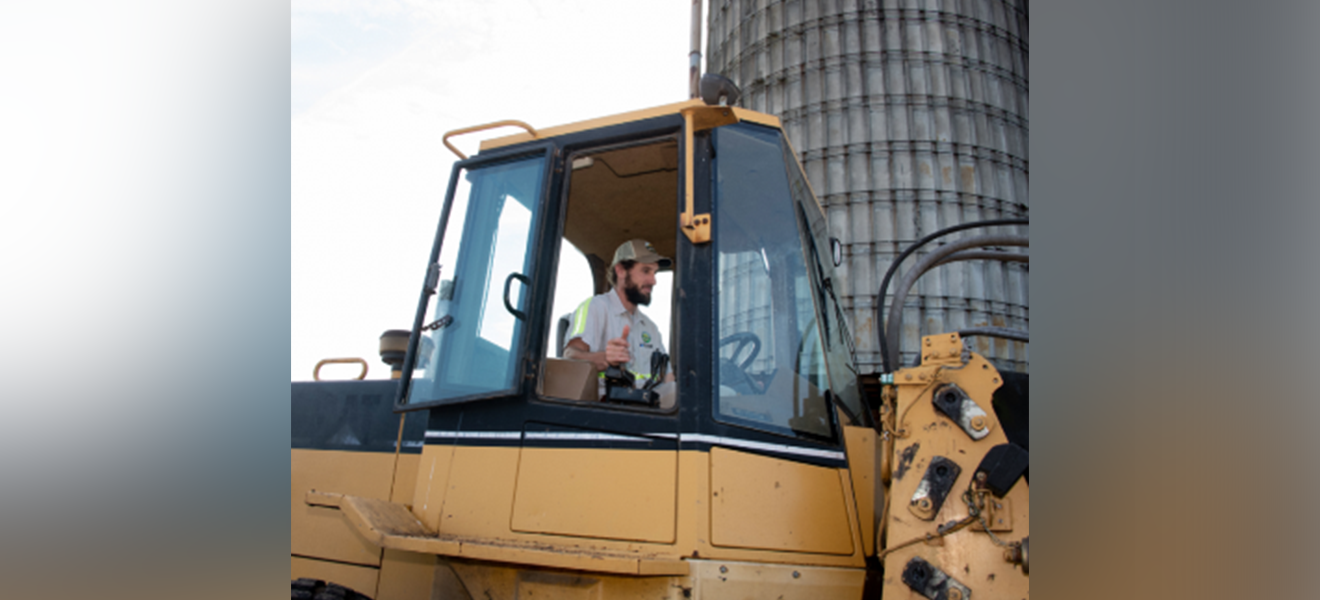When a local small food-waste composting business with a limited budget needed help developing an efficient data management system to improve daily operations and client communication, a team of MBA students from the Bryan School of Business and Economics stepped up to the challenge and delivered a time-saving solution.
“The data management system the UNCG students implemented brought our business to the next level, giving us a central point to view and analyze all the daily route data and easily configure reports for customers,” says Lyndsy Gallins, account manager for Gallins Family Farm. “The students built out a program in Google Data Studio that generates reports for individual customers with one click. On average, I would spend 20 hours a month creating individual reports, but with this program it takes one hour or less. Amazing!”
Gallins Family Farm collects more than 1 million pounds of organic waste from 160 different locations across the North Carolina Piedmont Triad each year and uses a clean, reliable process to recycle that food waste into Carolina Dynamite Compost. In addition to knowing they are choosing a more environmentally friendly way to dispose of discarded food, Gallins Family Farm’s clients also see cost savings in their monthly disposal costs. Managing pickups, establishing driver routes, and creating individualized reports is no easy task considering Gallins Family Farm’s sizeable client list — which includes UNC Greensboro, the University of North Carolina School of the Arts, Catawba College, Piedmont International University, Wake Forest University, Speas Global Elementary School, Summit School and several local coffee shops, juice shops, restaurants, and manufacturing facilities.
The students took on the challenge as part of their MBA capstone project. The Bryan School’s capstone project gives MBA students hands-on experience working with businesses seeking solutions. Partner businesses can use helpful data from UNCG’s databases, access to which would otherwise cost them as much as $20,000 per year.
“Working with the Gallins family was my first encounter with a sustainable business, but I don’t want it to be my last,” says April Miller ’19 MBA, an assistant vice president and closely held asset manager at Wells Fargo. “It was enlightening to see the amount of waste collected and diverted from landfills, especially after hearing the story of how Mr. and Mrs. Gallins began their business with limited resources. Being exposed to this business and industry brought my attention to how vital sustainable businesses are in supporting our communities and planet.”
FORGING A SYMBIOTIC PARTNERSHIP
Gallins says the student team took time to understand all the ins and outs of the company, really immersing themselves to get a full understanding of all the moving parts. “Each team member brought different strengths to the table and worked incredibly well together,” Gallins says. “They were very innovative in their creation and responded to all of our questions and concerns. I could not say enough good things about them; they greatly exceeded our expectations.”
Miller says hearing Gallins explain how the business struggled with managing internal data and how it cut into time with her family sparked a personal investment in the project’s success.
“My goals changed from wanting to complete the project for the class to helping Mrs. Gallins, her business, and her family,” Miller explains. “When we finished the project and received feedback from Mr. and Mrs. Gallins, we fully understood the meaningful impact of our solution. Being a part of this process and having tangible results gave me an overwhelming sense of pride for my team and our solution, and seeing our client’s success was a truly fulfilling experience.”
That solution required Miller and her teammates to tap into problem-solving, technological, analytical, organizational, and communications skills — skills that will be essential to their success in the business world.
“The capstone course is a transition from the academic to the business world,” says Dr. Mike Beitler, senior lecturer in the Department of Management and director of MBA Capstone Projects at the Bryan School. “Our students have a definite interest in green initiatives, so it was exciting for the student team helping Gallins Family Farm to work with a ‘business of the future.’ They showed a lot of creativity in developing their solution with a limited budget.”
Gallins and Beitler both say these capstone collaborations are unique opportunities for companies to work with business-savvy students committed to innovative and efficient solutions.
This story first appeared in the Fall 2020 Bryan Business Report.




